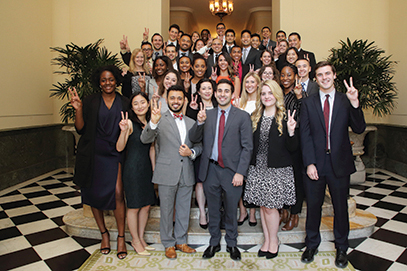When third-year Keck School of Medicine of USC student Chioma Moneme was making her final decision on medical schools, it was a call from Raquel Arias, MD, MPH, clinical associate professor of obstetrics and gynecology (clinician educator) and associate dean of admissions, that confirmed the New Jersey native’s decision to attend the Keck School.
“I can’t describe the myriad emotions that went through my mind when she told me the news,” Moneme said of the call informing her that she was the recipient of the Joseph and Mariette Schreiner Scholarship. “It made the decision truly easy; it lifted the burden of not just tuition, but also the very big stress of uprooting my life and moving across the country.”
Moneme recounted her experience as a medical student applicant to a crowd of nearly 150 people at the Keck School’s 12th annual Scholarship Luncheon, held Oct. 12 at the California Club in Los Angeles. The event honors scholarship benefactors and recipients, allowing donors to meet the students they support.
“You know what they say, it takes a village,” Moneme said. “All of you are part of my village and part of the villages of many future physicians, including some of the ones here today.”
Attendees also heard from Laura Mosqueda, MD, interim dean of the Keck School, who introduced herself to the audience, shared some statistics about the student selection process and emphasized the importance of scholarships for the field of medicine. Scholarship support allows the Keck School to recruit highly qualified students from diverse backgrounds, she said, and shared recent data that found a majority of students are graduating from medical schools with average debt loads of $200,000.
“This heavy financial obligation can affect everything in their personal and professional lives and it also affects the specialties they choose,” Mosqueda said. “The reality of student debt can discourage many from pursuing much-needed but less lucrative fields.
“When our alumni and friends ask what they can do, the most important thing that we can tell them is, if you want to help the medical school and really if you want to help the nation, help us help our medical students so that they don’t graduate with tremendous debts.”
— Melissa Masatani


